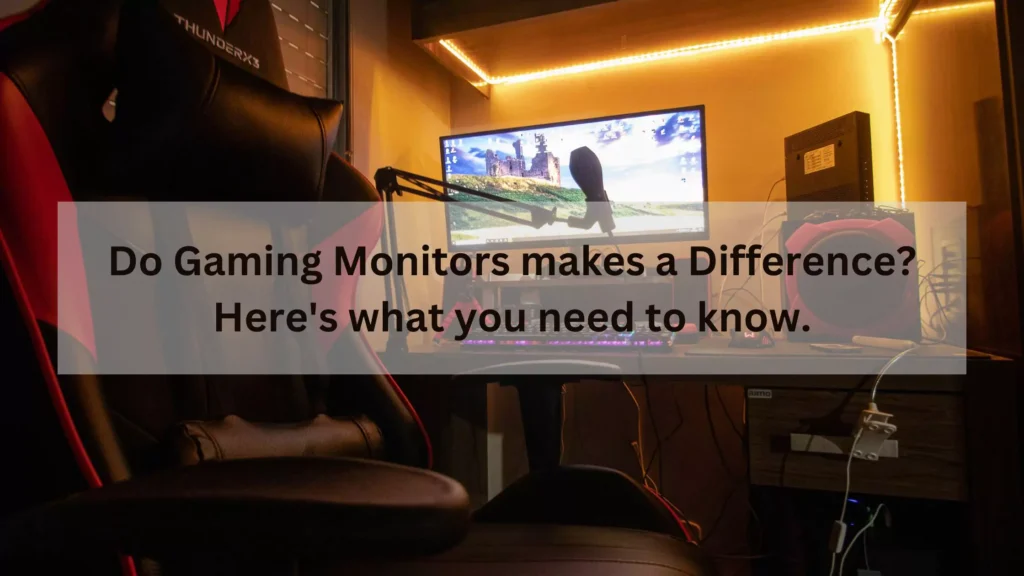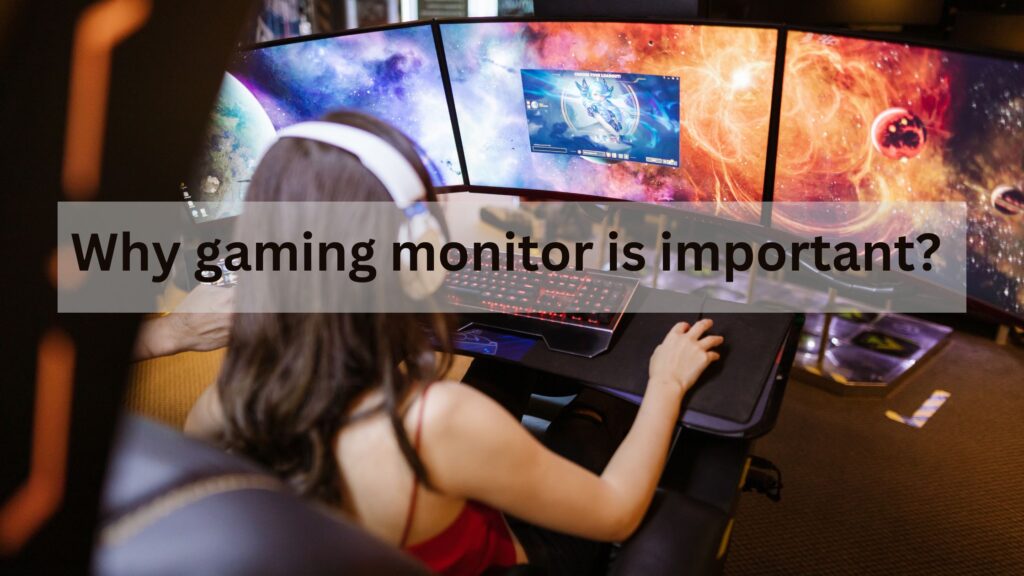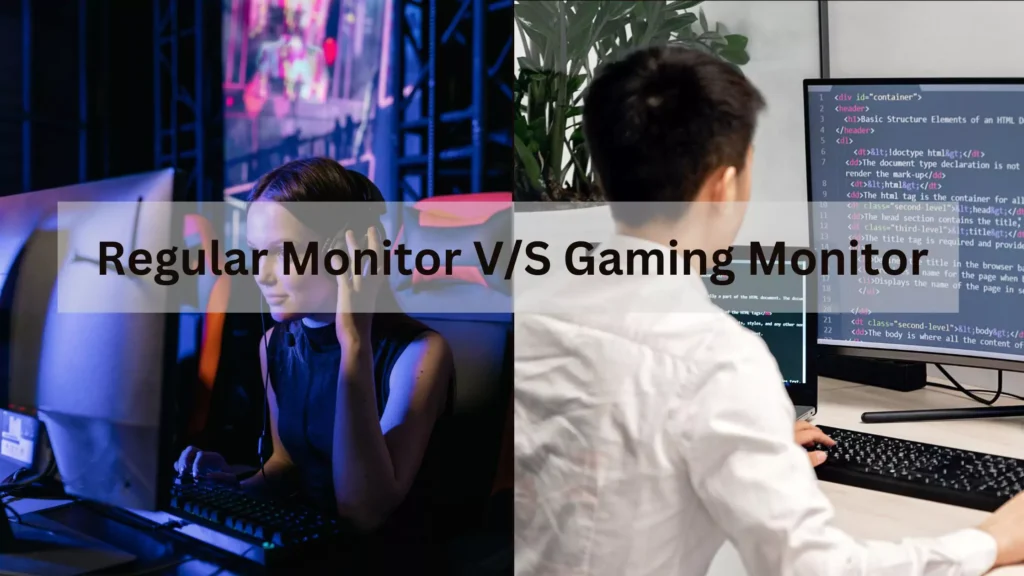When buying those expensive gaming monitors, people often think that it is worth purchasing and that gaming monitors make a difference. After continuous research and observations, some points need to be disclosed in front of you, Helping you decide whether it is worth purchasing or maintaining a good budget range while choosing the best gaming monitor for yourself. In this article, we will know that gaming monitors make a difference. If yes, what differences does it make, and is it worth buying for that price gap?

Do gaming monitors makes a difference?
Yes, gaming monitors make a big difference compared to normal monitors, as gaming monitors are built for high-intensive gaming that prioritises speed, responsiveness, and image quality. Gaming Monitors include high-refresh rates, low input lag, fast response time, adaptive sync technology, and higher resolution displays.
Normal monitors are used for basic purposes such as word processing, surfing browsers, basic utility functions, etc. It is the opposite of gaming monitors; it has an average refresh rate, input lag, average response time, and normal resolution display. The major and primary difference you can notice between a gaming and a normal monitor is its responsiveness, picture appearance, and quality.
At last, a gaming monitor differs from a normal monitor in our homes. Only If you’re in high-resolution and high-end graphics games, but If you want to play basic games with low to medium graphics, you can also prefer a normal monitor instead of wasting your money on gaming monitors.
Why is gaming monitor important?

Gaming monitor is important because of the three factors that makes them highlight in the market: Refresh Rate, Resolution, Response Time.
The Monitor’s refresh rate states how many images your screen displays per minute; the minimum refresh rate used by most monitors is 60Hz. For a beginner gamer, 60Hz can also be fine, but when it comes to a bit more advanced or more dominant gaming, you should prefer 144Hz (generally seen as better). Once you start gaming at this refresh rate, it is next to hard to switch back to 60Hz because of the smooth and high-quality performance of the 144Hz Monitor.
Resolution is a basic thing that most of you people must know; it is how many pixels you got on your screen. Technically the max resolution is currently 16k for gaming, but realistically the max is 4k (As 4x4k combined makes a 16k resolution monitor the same as 2x8k monitors). But, If you’re searching for the best and most highly-compatible resolution monitor, I’d prefer you to step up with 2k resolution monitors.
The response time is when your screen changes colors; the Lower the response time, the better it’ll be for gaming purposes, especially when it comes to multiplayer. It is one of the most important measures of a gaming monitor that should be considered while purchasing a gaming monitor.
Moreover, Whether that gaming monitor is important depends on your work and tasks. Let me explain to you through an example. Suppose you’re in a professional gaming field and require the best performance from your CPU on the screen. In that case, using a gaming monitor will be worth your money because, at that moment, you’re searching for the best performance out of your processing unit.
But if your hobby is gaming, and you like to play for a few minutes to hours a day, then purchasing a gaming monitor for those few minutes and hours may not be worth your purchase, Although hobby is a huge segment of self-satisfaction. So, At last, it depends on you and your requirements whether the gaming monitor will be worth your purchase or just a waste of money.
What’s the difference between a gaming monitor and a regular monitor?

Regular Monitor
- Regular Monitor have less refresh rate than gaming monitors, resulting in a slower and less fluid motion on the screen.
- The Regular Monitor typical have less response time than the gaming monitors, It is measured as how fast your screen changes color. Which is observed less in regular monitors.
- Input Lag, It refers to the delay between a player’s action (such as clicking a button) and the corresponding action on the screen, Regular Monitor have higher input lag than regular monitors.
- Regular monitor are usually smaller than the gaming monitors because they’re built for meeting the basic needs of a user such as web surfing, document editing, and basic necessities of a user.
- The Regular monitors doesn’t comes with any adaptive sync technologies. So maybe you can notice screen tearing and stuttering on the screen while working on it.
Gaming Monitor
- Gaming Monitor generally have higher refresh rates, resulting in a smoother and more fluid motion on the screen.
- The Gaming Monitor has a faster response time than regular monitors. A faster response time can help reducing ghosting and motion blur in fast-paced games.
- Whereas, The Gaming Monitor have lower input lag means that gamers can react more quickly in games, which can be especially important in competitive gaming.
- In case of gaming monitors, The Gaming monitors are often larger than regular monitors and may have a wider aspect ratio (such as 21:9) to provide a more immersive and high-quality gaming experience.
- Adaptive sync, It is one of the major technologies used in gaming monitors for synchronising the monitor’s refresh rate with the GPU’s output to eliminate screen tearing and stuttering.
Conclusion
In conclusion, gaming monitors significantly impact the user’s overall gaming experience. The high refresh rates, low input lag, and other features, such as adaptive sync technology, can provide a competitive edge for gamers, especially those who play fast-paced games and high-end graphics games. While gaming monitors can be more costly than regular monitors, their benefits are worth the investment for serious gamers. Moreover, gaming monitors can improve the visual experience with better color accuracy and contrast ratios.
Ultimately, whether a gaming monitor is worth the investment will depend on the individual’s preferences and budget, but for those who prioritise a smooth and responsive gaming experience, a gaming monitor is a must-have requirement for them.
Thanks for Reading 🙂
Cheers, Sarwar 🙂
That’s a great one thank you for sharing
Pingback: Are Curved Monitors better for Gaming? [Explained 2023]
Pingback: Does Connecting Laptop to TV increase FPS - Real or Myth?